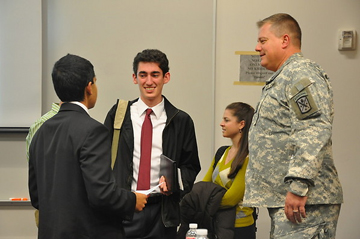ALLIES Holds Fourth Annual Intellectual Roundtable at the US Air Force Academy

|
|
On October 22-23, 2010, ALLIES, the Alliance Linking Leaders in Education and the Services, hosted its fourth annual Intellectual Roundtable at the U.S. Air Force Academy (USAFA).
Serving as the capstone event for ALLIES, the Roundtable previously has taken place at Tufts University and the U.S. Naval Academy (USNA). This year, over 25 students, cadets and midshipmen participated in the two-day conference. As part of the conference, the National Defense University’s Center for Advanced Strategic Learning hosted a Simulation Exercise (SIMULEX) for the attendees. Both Joint Research Project (JRP) groups presented the findings of their summer research trips. Additionally, leaders from the ALLIES chapters met to discuss how to improve the organization going forward. The Tufts Chapter of ALLIES was accompanied by IGL INSPIRE Fellow and Fletcher Security Studies Fellow Col. James Brown (far right in photo with ALLIES Co-Chairs Arjun Verma and Jeremy Guterl (center)).
Finally, the chapter leaders from Tufts, USAFA and USNA met to discuss approaches to improve ALLIES in the near-term. Most importantly, the leadership felt that in order for ALLIES to grow, it must improve communication, marketing and outreach. So that all the chapters are in contact, leaders will update one-another regularly through monthly conference calls. Additionally, the chapters will plan monthly joint meetings to discuss civil-military issues together. In terms of marketing and outreach, the chapters will construct a joint blog that includes all the chapters and will allow members to discuss news articles and promote events. Also, there will be a newsletter sent out to stakeholders so that ALLIES alumni and partners can stay updated of events on the campuses.
During the SIMULEX, students, cadets and midshipmen role-played bilateral negotiations between the Mexican and U.S. governments. The participants played various cabinet-level officials in each government and were asked to collaboratively develop a joint response to increased drug violence on both sides of the border. Students overwhelmingly found the SIMULEX to be a valuable learning tool, providing them first-hand insight into interagency policy-making. Several participants noted that one of the strengths of the exercise was that it was bilateral rather than U.S.-centric. As a result, participants were forced to assess national interests from another country’s perspective.
Following the SIMULEX, several groups presented the findings from their research trips this past summer. The Joint Research Project to Ukraine explored Ukrainian military reform and the impact of domestic and geopolitics. The group provided several policy recommendations for U.S. policy-makers, including increased military aid to Ukraine and diplomatic support for regional organizations like GUAM. The JRP to Uganda also gave a presentation on the relationship between development aid and security. The group examined water projects implemented by NGOs, USAID and AFRICOM to look at how access to basic resources affected insecurity. The group argued that increased partnership between NGOs and civilian organizations and AFRICOM should be a priority. Because civilians can provide the local knowledge and commitment and the military offers greater resources, a coordinated civil- military response can bring value on the ground.
Additionally, the USAFA Engineers Without Borders group attending the Roundtable presented the findings of their summer trip to Israel. In partnership with University of Colorado-Boulder, military cadets and undergraduate civilian students in the U.S. and Israel looked at development projects for a local Bedouin population. Although this project was not done by ALLIES, it was agreed upon that if this project is continued next summer, it should include ALLIES chapters because of the integrated civil-military component.

